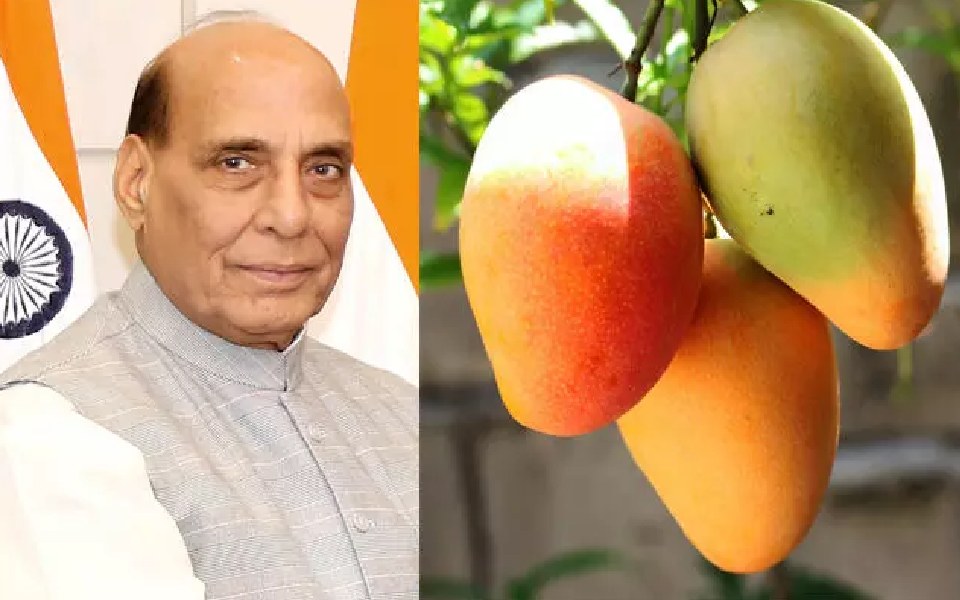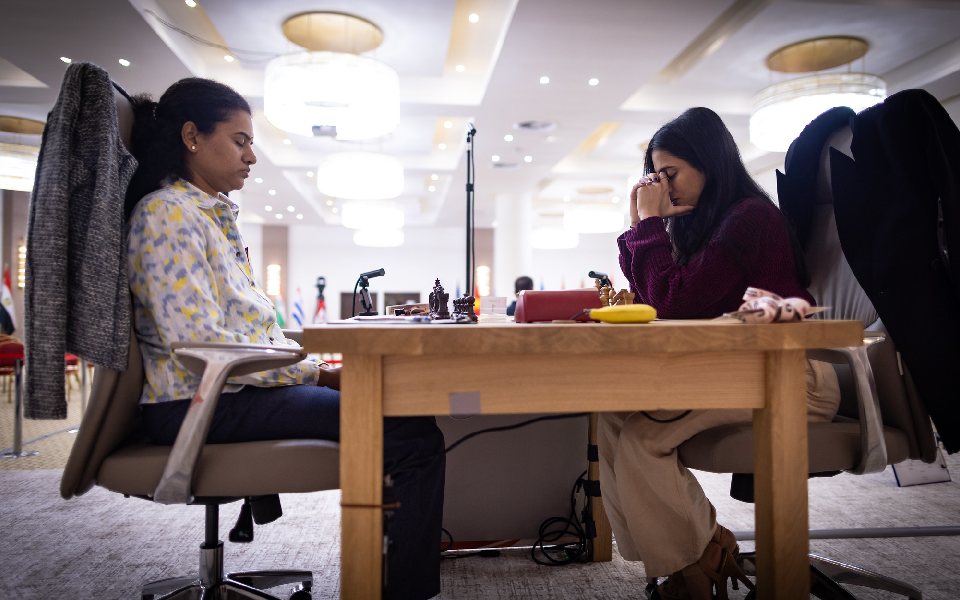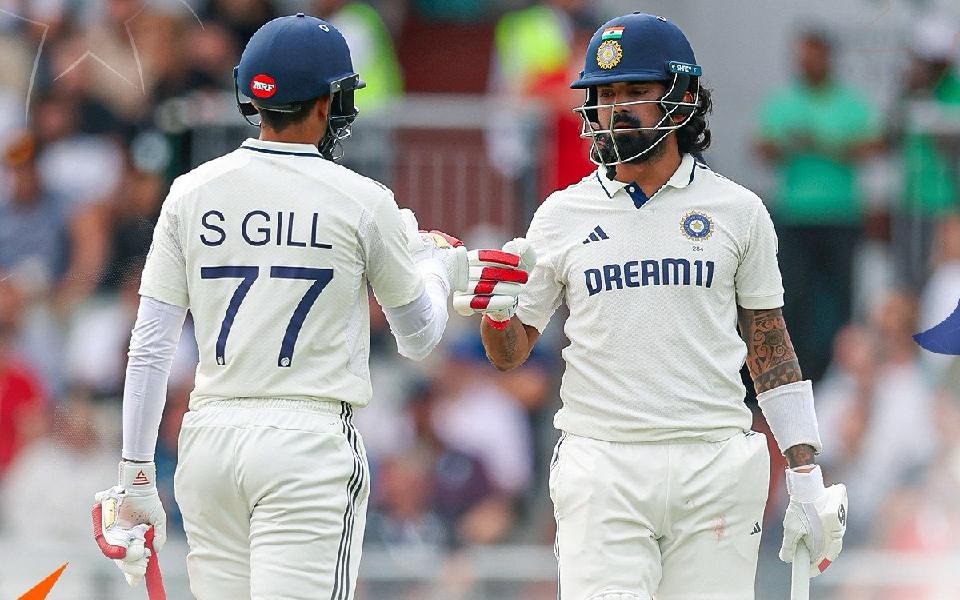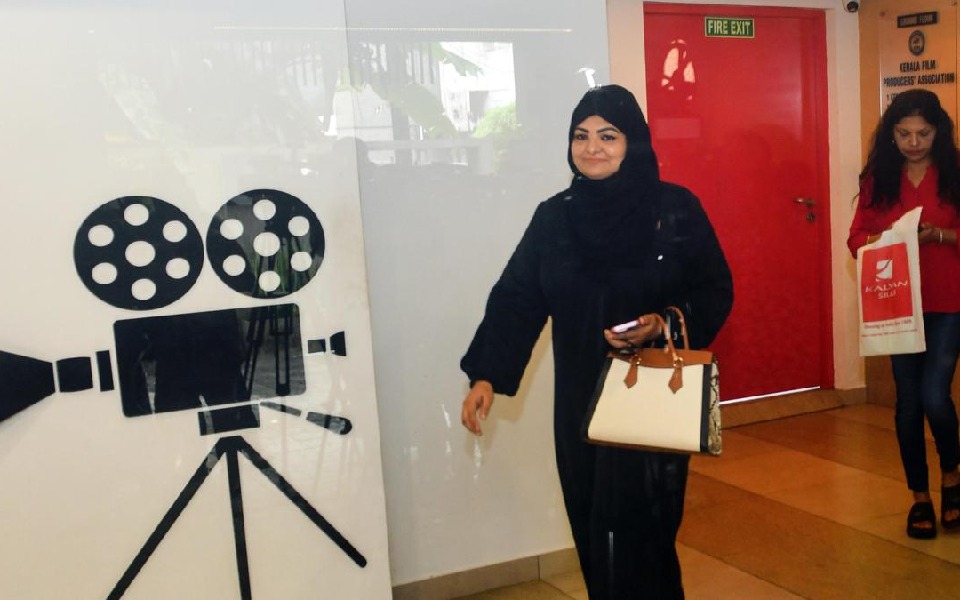Lucknow, Jun 6 (PTI): Kalimullah Khan, popularly known as the 'Mango Man' of India, has named a newly developed mango variety after Defence Minister Rajnath Singh.
Grown using his signature grafting technique in his Malihabad orchard, the new variety has been named 'Rajnath Aam'.
Khan, who has earlier named mango varieties after several prominent Indian personalities, including Sachin Tendulkar, Aishwarya Rai, Akhilesh Yadav, Sonia Gandhi, Narendra Modi, and Amit Shah, was awarded the Padma Shri for his unique contributions and dedication to horticulture and fruit breeding.
Speaking about his latest tribute, Khan told PTI Videos, "I name my mangoes after people who have served the country meaningfully. I want these names to live on for generations.
"Sometimes people forget great leaders, but if a mango reminds them of Rajnath Singh's good work, then it's worth it. He is a balanced and thoughtful individual. During a recent discussion about Pakistan, I found that he sincerely desires peace, not war."
On the Pahalgam terror attack in Kashmir that left 26 people dead, Khan blamed Pakistan for initiating aggression.
"But today, the atmosphere has improved. Peace, not conflict, is the solution. Problems should be resolved through dialogue. War only escalates hatred and brings harm to all. We are all human, and division only causes more damage," he said.
Talking about the Malihabad region in Lucknow, known world over for its mangoes, Khan recalled that there were more than 1,300 mango varieties in the area in 1919, but over time, many have disappeared from the market.
"I've been working to preserve and revive them, and today I've developed over 300 varieties," he said.
Khan, who began experimenting with crossbreeding mangoes as a child, shared that he only studied up to Class 7.
"I was never inclined toward classroom studies. I respected my teachers and classmates, but I kept failing in Classes 4, 5, 6, and even 7. My heart was always in the orchard."
Born in 1945, according to official records, Khan said he still feels physically fit, despite having undergone a heart surgery and facing other health issues in his 80s.
Among his many creations, he spoke proudly of the "Asl-ul-Muqarrar" variety of mangoes, which he began developing in 1987. He also recalled an encounter with the then World Bank president, who visited Malihabad.
"I told him about a special mango tree that emitted a fragrant aroma, which I believe works like a tonic for the brain. At first, I wondered what I was doing, telling such things to such a high-ranking man. But he came to the orchard, smelled the tree's fragrance, and was amazed. He then instructed officials to allot me five acres of land to expand this work," he said.
However, Khan noted with a tinge of disappointment that despite the presence of senior officials from the central and state governments during that visit, no action was ever taken on the land promise.
Speaking about his life's mission, Khan said, "I want people to keep enjoying different varieties of mangoes long after I'm gone, especially those who truly love this fruit. Mango is one of the few fruits in the world that can help people stay healthy and has healing powers."
He added that he has documented evidence of the mango's medicinal benefits in various places.
"Now, we have to see how far the research institutions can take these findings and turn them into real scientific progress."
Let the Truth be known. If you read VB and like VB, please be a VB Supporter and Help us deliver the Truth to one and all.
Batumi (Georgia), Jul 26 (PTI): Young Indian International Master Divya Deshmukh held her nerves to hold stalwart Koneru Humpy to a draw in game 1 of the FIDE Women's World Cup final, with both players having their share of opportunities to take the lead here on Saturday.
The draw with black means Humpy, the two-time World Rapid champion, holds a slight edge going in the second and final game under the classical chess rules in the two-game mini-match, and should the deadlock continue, games of shorter duration will be played to determine the winner.
Humpy employed the Queen's gambit accepted as black and it turned out to be a pretty fascinating game right out of the opening as Divya, 19, came up with a piece sacrifice early to deny the black king the right to castle.
Humpy was the first to err and, according to computers, Divya had things under control on the 14th move. However in her bid to recover the extra material, the Nagpur girl, who has secured a place in the Candidates tournament with her sterling performance here, missed a promising continuation.
What followed the exchange of all minor pieces and the ensuing queen and rook endgame gave enough counter play to both players. The game was eventually drawn after Humpy sacrificed her rook to force perpetual checks.
"The game saw an extremely sharp battle with the game ending in a draw in 41 moves. On move 7, Divya made her aggressive intentions clear by offering another pawn,
which looked like home preparation. Humpy made a practical decision of refraining from taking the pawn and a balanced position was reached by move 10 by white," said Grandmaster Pravin Thipsay, an Arjuna awardee and the first Indian to get a chess Grandmaster norm.
"However, instead of developing the undeveloped Knight, Humpy retreated the centralised Knight on move 10, giving huge positional advantage to Divya. Divya could have gained huge positional advantage on the 12th move by moving a rook. However, she chose to play for King side attack by sacrificing a piece instead.
"Humpy, too, erred at this stage and instead of moving the King to Queen side, moved it to the King side. Divya, on move 14, could have obtained a crushing attack by threatening a mate by developing her Queen. Instead she chose to exchange a pair of Bishops first, which enabled Humpy to defend her King by returning the piece," said Thipsay.
"Players thus reached a balanced Queen and two Rooks ending. Divya continued to play ambitiously and tried to attack Humpy’s King but the latter defended accurately and the game was drawn in 41 moves by perpetual check," he added.
In the play-off for the third place, Chinese players Zhongyi Tan, the former women's world champion and top seed Lei Tingjie also decided to split points out of a Queen’s gambit declined game.
The opening raised visions of a close contest between the two but having been knocked out of title race in the previous round, none of them wanted to take any huge risk. It was still a middle game when the players shook hands.
With the top two positions sealed for the Indians, the berth to the next Candidates is also assigned, while the player finishing third will also get an entry to the premier event scheduled for 2026.
Results: Divya Deshmukh (Ind) drew with Koneru Humpy (Ind); Zhongyi Tan (Chn) drew with Tingjie Lei (Chn).





